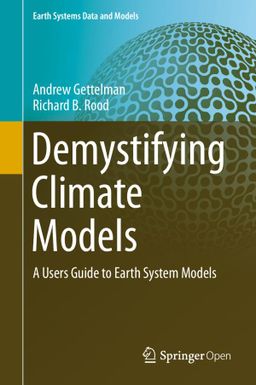Demystifying Climate Models
- Description:
- Human-caused climate change is perhaps the defining environmental issue of the early twenty-first century. We observe the earths climate in the present, but observations of future climate are not available yet. So in order to predict the future, we rely on simulation models to predict future climate. This book is designed to be a guide to climate simulation and prediction for the non-specialist and an entry point for understanding uncertainties in climate models. The goal is not to be simply a popular guide to climate modeling and prediction, but to help those using climate models to understand the results. This book provides background on the earths climate system and how it might change, a detailed qualitative analysis of how climate models are constructed, and a discussion of model results and the uncertainty inherent in those results. Throughout the text, terms in bold will be referenced in the glossary. References are provided as footnotes in each chapter. Who uses climate models? Climate model users are practitioners in many fields who desire to incorporate information about climate and climate change into planning and management decisions. Users may be scientists and engineers in fields such as ecosystems or water resources. These scientists are familiar with models and the roles of models in natural science. In other cases, the practitioners are engineers, urban planners, epidemiologists, or architects. Though not necessarily familiar with models of natural science, experts in these fields use quantitative information for decision-making. These experts are potential users of climate models. We hope in the end that by understanding climate models and their uncertainties, the reader will understand how climate models are constructed to represent the earths climate system. The book is intended to help the reader become a more competent interpreter or translator of climate model output.
- Display date:
- 2016
- Collections:
- Secretariat of the Pacific Regional Environment Programme (SPREP)
- Publisher:
- Springer Berlin Heidelberg
- Content partner:
- Secretariat of the Pacific Regional Environment Programme (SPREP)
- Availability:
- Not specified
-
Copyright status: All rights reservedFind out more about what you are able to do with this itemThis item is all rights reserved, with means you'll have to get permission from Secretariat of the Pacific Regional Environment Programme (SPREP) before using it. For more information, please see our use and reuse page.What can I do with this item?Non-infringing useNZ copyright law does not prevent every use of a copyright work, and this item may be hosted by an international institute or organisation. You should consider what you can and cannot do with a copyright work.No sharingYou may not copy and/or share this item with others without further permission. This includes posting it on your blog, using it in a presentation, or any other public use.No modifyingYou are not allowed to adapt or remix this item into any other works.No commercial useYou may not use this item commercially.
Related items
Welcome and warm Pasifik greetings
The information on this site has been gathered from our content partners.
The names, terms, and labels that we present on the site may contain images or voices of deceased persons and may also reflect the bias, norms, and perspective of the period of time in which they were created. We accept that these may not be appropriate today.
If you have any concerns or questions about an item, please contact us.
